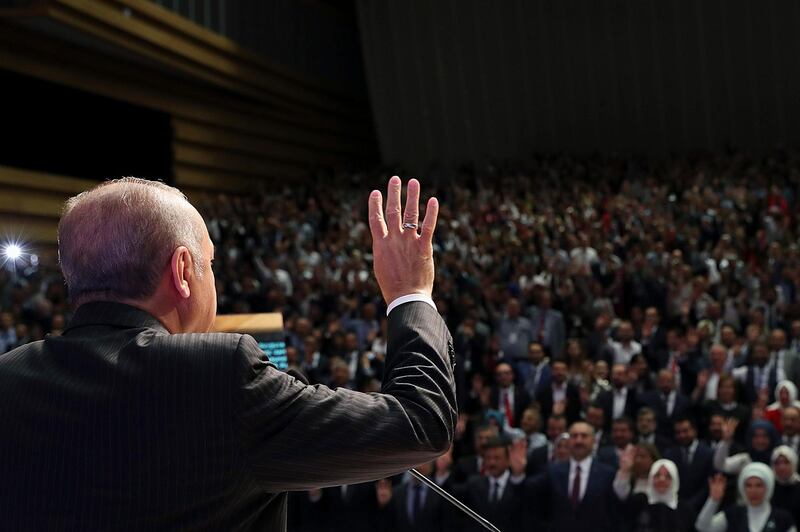There is turmoil in Ankara. The national currency this month hit repeated lows against the dollar, setting off a national crisis – one that was further exacerbated when US president Donald Trump decided to double tariffs on steel and aluminium, apparently as punishment for Turkey's arrest of an American Christian pastor.
Turkey's president Recep Tayyip Erdogan has adopted the language of war, telling supporters the crisis was "a national domestic battle" and that Turkey, in response, would boycott US electronics.
But with Ankara distracted with domestic issues, the Syrian regime has been pressing ahead with its attacks on Idlib province, the last rebel stronghold, seeking to take advantage of Turkey's disarray to score victories on the real battlefield.
In the last week the Syrian regime, which had been massing tanks at the border between its territory and Idlib, began shelling towns all along the border. Troops are also gathering in Hama, the regime-controlled city closest to Idlib province. Helicopters have flown across the province, dropping leaflets warning residents that the war “is almost over” and urging them to accept the return of the regime.
The attacks by the regime this week have focused on the southern and western edges of the province; the strategy seems to be to push north along the Damascus-Aleppo highway, and, in the west, retake the strategic city of Jisr Ash Shugur. But the whole province is braced for what might be an all-out assault.
Such an assault would be catastrophic for the 2.5 million civilians in Idlib province. But it would also be catastrophic for Turkey's policy. So long in the ascendant in Syria, Turkey is now stretched by domestic issues at home. The last thing it needs is a growing foreign crisis as well.
Yet the problem for Turkey is that salvaging its Idlib strategy is the only way out of the Syrian conflict.
Whatever Turkey does in Idlib will bring criticism. Seeking to stay in the region will entail significant expense and a military commitment, which will bring domestic criticism.
It could also bring international censure over a prolonged occupation of Syrian territory. There is no possible way that Bashar Al Assad's government would accept handing over parts of Syrian territory, which means that Turkey would be staying in the region with the “permission” of the rebels or of the Syrian population of Idlib, a situation uncomfortably close to how Russia justified its annexation of Crimea, which brought near-universal condemnation and sanctions.
Given Turkey’s deteriorating relationship with the European Union and the United States, that would add fuel to the fire for the West.
Nor would Turkey staying be popular with Syrians. At the moment it is being welcomed as a plausible alternative to regime rule. But in time, Syrians will ask why their country must be run by foreigners.
Yet staying might be the best of a number of bad options. Leaving would be seen as a betrayal by the Free Syrian Army rebel groups that Turkey has spent so long training.
Syrians inside those areas that have been protected by Turkey would also feel betrayed at the desertion. And once the inevitable purges by the regime's security services begin, there might be “blowback” in the form of revenge attacks on Turkish soil.
Worst of all, from Turkey’s perspective, the return of the regime to these areas would be preceded by mass attacks of the sort seen in other recaptured rebel areas. That would precipitate an exodus of Syrians seeking sanctuary, with up to one million potentially seeking refuge in Turkey.
Turkey is being backed into a corner and is turning to Russia for a way out.
When the two sides met in Sochi at the end of July, it appeared that Ankara had accepted a deal whereby it would deal with the militant groups inside Idlib province in return for the regime halting a full-scale incursion.
Here it appears Moscow was seeking a balance: to use Turkey to stop militant attacks on its military base in Latakia while also agreeing to let the regime retake the western parts of Idlib.
But that is merely a temporary solution. A bigger framework will be needed to stop the regime from retaking Idlib. Since Monday, Russia's foreign minister Sergei Lavrov has been in Ankara trying to find one. Yet time is running out.
What has emerged so far is a Russian plan for a four-way Syria summit with Turkey, Germany and France – an intriguing development and one that noticeably cuts out the US and Britain, both of which have taken a hard line over the poisoning of a former Russian spy in an English town.
For Russia, anything that internationalises the conflict is a positive step because it offers more powerful countries a stake in Russia’s plan for Syria while also cementing Russia’s reputation as a major power that can impose settlements.
But whether the summit will happen and whether it can actually stop a regime attack is difficult to predict. There is every chance that the Syrian regime will simply seize its moment and move into Idlib, knowing Turkey is too distracted at home.
Even if it doesn't, that might not solve Ankara's woes, as the joint Syrian army that Turkey is assembling inside rebel territory is under stress due to long-standing rivalries between rebel forces. Turkey's long-planned Syria policy is in danger of fracturing.
It may well be that Ankara has run out of luck; that, as with its currency at home, its plans in Syria have taken a dive and no amount of political intervention can stop the slide.





